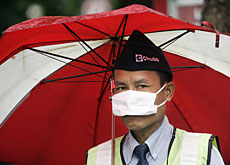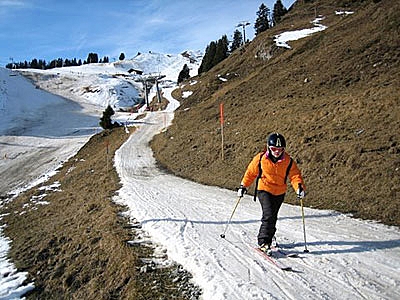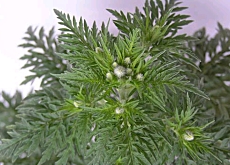Climate change is bad for your health

If climate change and global warming continue unchecked, it's not only glaciers that will be affected – your health and quality of life are also at risk.
According to “Climate Change and Switzerland 2050”, a report by the Advisory Body on Climate Change (OcCC), Switzerland faces a range of negative health impacts.
They are both direct, such as the consequences of rising temperature and natural disasters, and indirect, such as increased incidence of diseases.
On June 6, World Environment Day, the director-general of the World Health Organization Margaret Chan estimated that 60,000 people die every year because of climate-related natural disasters.
“Limiting the impact of climate change is about saving lives and livelihoods, as much as it is about protecting the natural environment,” she said.
These health threats are overwhelmingly concentrated in the poorest regions of the world, nevertheless the global nature of climate change means no country is unaffected.
According to the OcCC, the main direct threat to Switzerland is an increase in heatwaves, such as the one in 2003 which resulted in more than 44,000 additional deaths across Europe – including almost 1,000 in Switzerland.
Health experts say by 2050 such heatwaves will be occurring “every few years”.
“The problem with heatwaves is that it’s very hot during the day but it’s also warm during the night,” Ursula Ulrich-Vögtlin from the Federal Health Office told swissinfo.
“This means we have to drink more, but elderly people are not used to drinking a lot – not like young people who always have their little bottles with them. As you get older you don’t feel thirsty, but you have to drink.”
Indirect threats
However, potentially more serious consequences may arise indirectly. Warmer temperatures and a more variable climate can have an effect on agricultural production and food availability, the availability of clean water and sanitation, and the transmission of vector- and water-borne diseases.
“Parasites have a very complex transmission pattern frequently related to vectors [organisms which carry pathogens], and the climate significantly influences the activity of those vectors,” Bruno Gottstein from the Institute of Parasitology at Bern University told swissinfo.
“We’ve observed in animals a slight increase of parasitic diseases that previously were encountered more in warmer areas such as the Mediterranean basin. Part of this is due to increased travel activity, but part is because the cycle of those infectious organisms has been established in areas such as Switzerland.”
So will tourists to Switzerland have to get jabs and take malaria pills?
“We haven’t reached that stage!” Gottstein said. “We are finding new species of mosquito and there is a potential that those malaria-transmitting vectors could establish in Switzerland, but that hasn’t occurred so far.”
Martin Beniston, professor of climate research at Geneva University, says another consequence could be an increase in the incidence of allergies such as hay fever.
“Certainly there have been several recent studies showing that invasive plant species already coming into the country could move in more rapidly as climate warms and becomes more favourable to more allergenic species such as ambrosia [ragweed],” he told swissinfo.
At present 15-20 per cent of the Swiss population suffer from a pollen allergy.
Public awareness
However, every cloud of greenhouse gas has a silver lining. For example, milder winters would reduce the seasonal winter-time peak in deaths that occurs in temperate countries. In currently hot regions an increase in temperatures might also reduce the viability of disease-transmitting mosquito populations.
Overall, however, scientists believe most of the health impacts caused by climate change would be negative.
Most experts also believe the Swiss government is sufficiently aware of this, but the “invisible” nature of the problem means the public still has not got the message.
“The risk perception for bird flu is very good – everyone has heard about the deaths in Asia,” said Ulrich-Vögtlin. “But for [climate change], a lot of people say ‘oh it’s wonderful to have such hot weather’.”
She adds: “You don’t see someone falling down in the street and dying from air pollution, but the effect from air pollution on cardiovascular system or lungs is what causes death.”
swissinfo, Thomas Stephens
Extremes of temperature – heat-related deaths could increase, but this could be offset by milder winters and fewer cold-related deaths.
Flooding – an increased frequency of severe river floods is predicted. Psychological problems are the most important health issue among flood victims because of personal and economic loss and stress.
UV exposure – levels of UV radiation may increase due to sunnier summers, a decline in cloud cover and ozone depletion.
Vector-borne diseases – various diseases transmitted by mosquitoes or ticks are climate-sensitive and can increase or be introduced due to climate change.
Water-borne disease – secure sanitation systems should safeguard supplies of drinking water, but possible contamination of storm water outflows could carry disease into basements and nearby rivers.
Food poisoning – higher temperatures in summer could cause extra cases of salmonella infection.
Storms – an increase in severe winter storms could lead to an increase in injuries from landslides, flying debris and falling trees.

In compliance with the JTI standards
More: SWI swissinfo.ch certified by the Journalism Trust Initiative




You can find an overview of ongoing debates with our journalists here. Please join us!
If you want to start a conversation about a topic raised in this article or want to report factual errors, email us at english@swissinfo.ch.